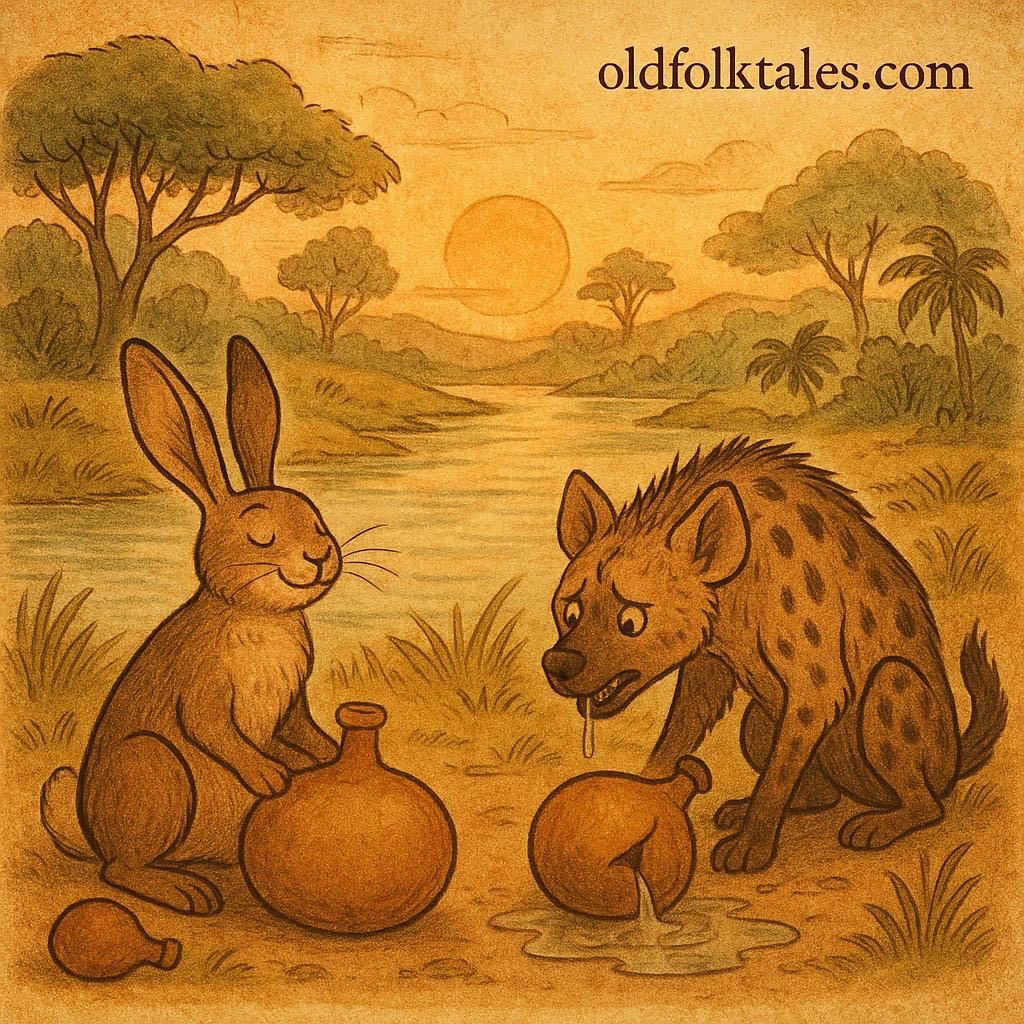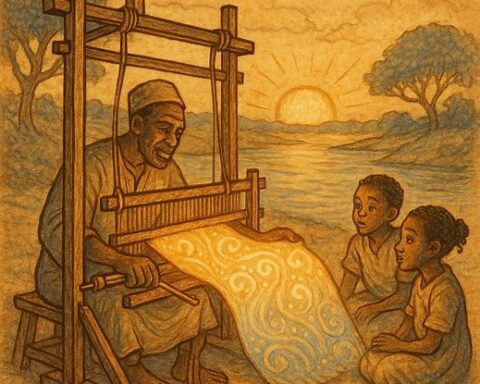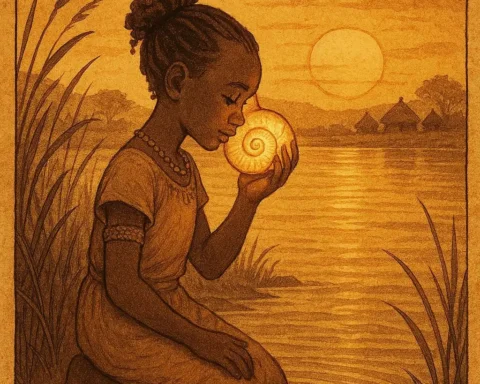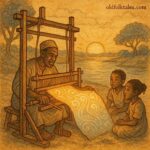In a small Wolof village nestled among the rolling fields and whispering baobab trees, the sun rose slowly over the horizon, casting golden light across the dusty paths. Birds sang softly in the early morning, and the villagers began their daily routines, fetching water, tending to their gardens, and calling to one another in warm greetings. In this village lived a clever hare, known for her quick mind and cunning ways, and a greedy hyena, whose appetite often got the better of him.
One morning, the hare discovered a smooth, shiny calabash in the shade of an ancient tree. She ran her paw along its surface, marveling at how perfectly round and watertight it was. She knew immediately that this calabash could carry water without spilling a single drop. Not far away, the hyena had his own calabash. But unlike the hare’s, his was rough, full of cracks, and impossible to seal properly. He tried to patch it with mud, but the water still leaked through every hole.
“Ha!” the hyena laughed, his sharp teeth flashing. “I will fetch more water than you today, Hare. My calabash is as good as yours, you will see.”
The hare simply smiled, her long ears twitching in amusement. “We shall see,” she replied gently, knowing the truth but willing to let the hyena discover it for himself.
Soon the villagers lined up at the river. The hare dipped her calabash into the cool, flowing water. She lifted it carefully, feeling the weight of the liquid inside. Not a single drop escaped. She trotted along the path back to the village, proud and satisfied. Behind her, the hyena struggled with his calabash. Water gushed through the cracks, wetting his paws and staining his rough fur.
By the time the hyena reached the hare, he was frustrated and panting. “Hare!” he shouted, “my calabash is ruined! Please, just a little water. I cannot carry it all back.”
The hare looked at him with gentle eyes, but her expression was firm. “You should have been careful, Hyena. I worked hard to polish my calabash. You must learn to take care of your own things.”
The hyena whined, stamping his paws. “Please, Hare. Just a sip. I am so thirsty. I promise I will not touch your calabash again.”
The hare shook her head slowly. “No. You must learn responsibility for your actions. My calabash is full, but it is mine to carry. You must fetch your own water if you want to drink.”
The hyena growled and stomped away, defeated. The hare, however, continued on her path, humming a cheerful tune as she brought the water back to her family and friends. The villagers praised her cleverness, marveling at how the hare had thought ahead while the hyena had relied on luck alone.
As the days passed, the story of the hare and the hyena spread throughout the village. Children repeated it by the fireside, laughing at the hyena’s greed and admiring the hare’s wisdom. Farmers told their neighbors how important it was to prepare carefully and take responsibility for one’s own work. Even the hyena began to realize that cunning alone could not solve every problem; effort, care, and foresight were equally necessary.
By the time the sun dipped behind the baobab trees, painting the sky in shades of orange and pink, the hare rested under her favorite tree, her calabash full and safe. The hyena watched from a distance, licking his wounds and silently promising to be more careful in the future.
That evening, as the villagers gathered around the fire, the elders reminded everyone that intelligence and diligence often outshine strength and greed. The hare’s story became a lesson not just for the young, but for everyone who wished to live well in the village.
Moral Lesson
The story of The Clever Hare and the Calabash Challenge teaches that careful preparation, responsibility, and foresight are more valuable than greed and impatience. While the hyena relied on luck and demanded help, the hare’s diligence and cleverness ensured her success. Life rewards those who take care of their own work and think ahead, rather than depending on others to fix their mistakes.
Knowledge Check
Why was the hare’s calabash able to hold water while the hyena’s could not?
The hare’s calabash was polished and watertight, whereas the hyena’s was rough and full of cracks.What did the hyena ask the hare when he could not carry water?
He begged the hare for water because his calabash kept spilling.How did the hare respond to the hyena’s request?
She refused, explaining that he must learn responsibility for his own actions.What lesson did the villagers learn from the hare and the hyena?
They learned that careful preparation, responsibility, and foresight are more important than greed or relying on others.How did the hyena react after he failed to get water from the hare?
He was frustrated and defeated, eventually realizing the importance of effort and care.What does this story teach about intelligence versus greed?
Intelligence, careful planning, and diligence lead to success, while greed and impatience often result in failurecultural origin:
wolof folktales, Senegal
Source: René Guillot, Contes d’Afrique, 1933, p. 89.






